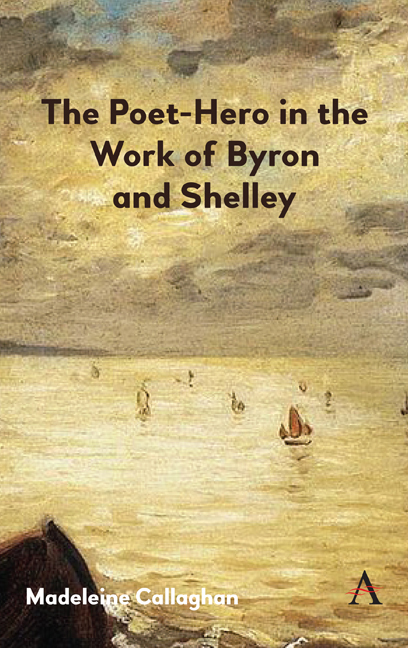Book contents
- Frontmatter
- Dedication
- Contents
- Acknowledgements
- Note on Texts and Abbreviations
- Introduction: The Poet-Hero: ‘Who shall trace the void?’
- Part I Byron
- Chapter One ‘A tyrant-spell’: The Byronic (Poet-)Hero in Manfred, Childe Harold's Pilgrimage and Beppo
- Chapter Two ‘Degraded to a Doge’: Inappropriate Poetic Heroism in Marino Faliero
- Chapter Three ‘Thoughts unspeakable’: Poetic Heroism under Pressure in Cain and The Deformed Transformed
- Chapter Four Poetic Heroism and Authority: Don Juan and ‘Epistle to Augusta’
- Interchapter
- Part II Shelley
- Conclusion The Byronic and the Shelleyan Poet-Hero
- Bibliography
- Index
Chapter Four - Poetic Heroism and Authority: Don Juan and ‘Epistle to Augusta’
from Part I - Byron
Published online by Cambridge University Press: 30 March 2019
- Frontmatter
- Dedication
- Contents
- Acknowledgements
- Note on Texts and Abbreviations
- Introduction: The Poet-Hero: ‘Who shall trace the void?’
- Part I Byron
- Chapter One ‘A tyrant-spell’: The Byronic (Poet-)Hero in Manfred, Childe Harold's Pilgrimage and Beppo
- Chapter Two ‘Degraded to a Doge’: Inappropriate Poetic Heroism in Marino Faliero
- Chapter Three ‘Thoughts unspeakable’: Poetic Heroism under Pressure in Cain and The Deformed Transformed
- Chapter Four Poetic Heroism and Authority: Don Juan and ‘Epistle to Augusta’
- Interchapter
- Part II Shelley
- Conclusion The Byronic and the Shelleyan Poet-Hero
- Bibliography
- Index
Summary
The ‘Epistle to Augusta’ and Don Juan show Byron exploring and exploiting the possibilities of transforming the self into the poet-hero. Don Juan, despite a chorus of contemporary disapproval (albeit with notable exceptions, such as Shelley and Lockhart), became the poem that later critics would praise as his greatest achievement. The relationship between Juan and his narrator, unlike that between Harold and his narrator, becomes the source of ‘wanton facility’, furnishing the poem a buoyant confidence as Byron makes the self the source of poetic authority. Yet this self is not simply personal. Don Juan shows Byron teasingly engage with the problem of self-revelation, tempting the reader into biographical speculation even as he refuses any such impulse to ‘stoop[ed] to truth’. In the ‘Epistle to Augusta’, Byron makes his legend more literary than biographical, and crowns his poetry as the source of poetic heroism. The ‘Epistle’ does not show Byron creating new readings of Milton and Wordsworth's poetry; rather, Byron recalls his other allusions to their work, particularly his recasting of their themes and poetry in Childe Harold's Pilgrimage. The ‘Epistle’ is insular even as it seems to reach out towards Milton and Wordsworth. The Byronic literary legend becomes an echo chamber where Byron's past and present readings of these poets confront one another in a single arena. This effort to render his own poetry the site of poetic authority in the ‘Epistle’ requires Byron to perform self-referentially, referring to his work's recent readings of his precursors. Both ‘Epistle to Augusta’ and Don Juan approach the problem of authority by creating a poet-hero out of the self, a self that signals the particular cast of his poetic legend that extends beyond the biographical.
Robert R. Harson's essay ‘Byron's “Tintern Abbey”, diminishes Byron's achievement in the ‘Epistle to Augusta’ by referring to the poem as a ‘failure’ in comparison to Wordsworth's poem, seeing the ‘Epistle’ as showing Byron ‘striking the familiar stance of the Byronic hero’. However, this reference to a ‘familiar stance’ prompts the question of how familiar it is in Byron's poetic repertoire, and how far Byron rewrites ‘Tintern Abbey’, and to what end.
- Type
- Chapter
- Information
- The Poet-Hero in the Work of Byron and Shelley , pp. 87 - 102Publisher: Anthem PressPrint publication year: 2019



